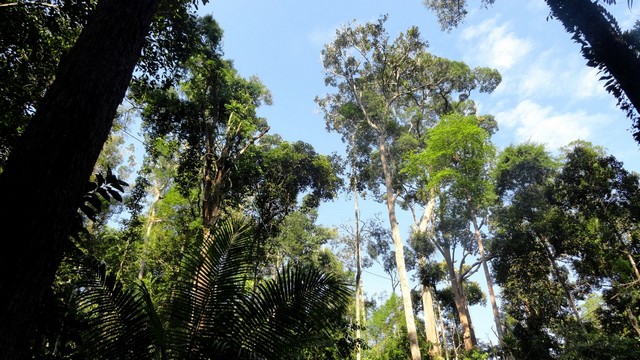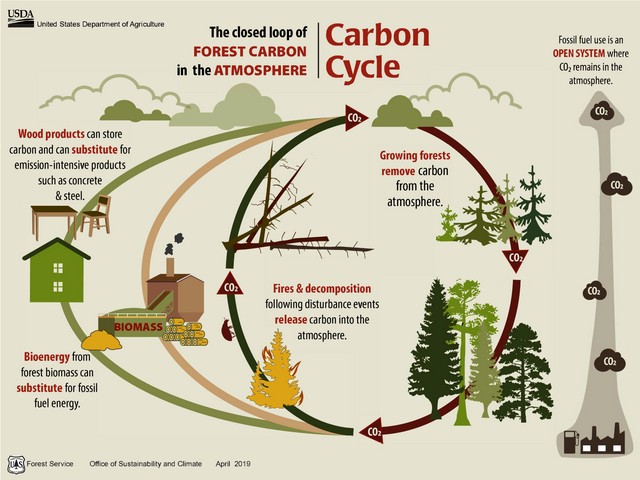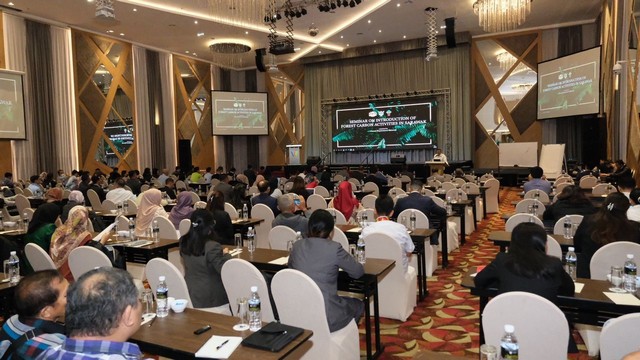Forests are crucial in tackling climate change. According to the International Union for Conservation of Nature and Natural Resources (IUCN), they balance ecosystems, safeguard biodiversity, provides a means of living for communities, and supply goods and services that drive sustainable progress.
They are also fundamental elements of the carbon cycle. Trees, for example, remove carbon from the atmosphere; store it in their trunks, branches, leaves and roots; and release it back to the atmosphere when they decay after death or burn during fires.
On the other hand, forests can be a source of greenhouse gas (GHG) emissions when they are subjected to the likes of deforestation and forest degradation. When these activities go unchecked, these lands end up emitting more carbon than they capturing it – which is unfortunately the case for some tropical forests.
It is therefore important to prevent further losses and degradation of forests, and promote activities that reduce forest carbon emissions.
The World Wide Fund For Nature (WWF), which has been active in the forest carbon field since 2007, posits that forest carbon activities must be implemented “in ways that produce real emissions reductions while protecting biodiversity, upholding indigenous peoples’ and local communities’ rights, and promoting practices for appropriate benefit sharing with local stakeholders.”

In Malaysia, Sarawak becomes the first state in the country to carry out the forest carbon initiative when the Dewan Undangan Negeri Sarawak (DUN Sarawak) passed amendments to its Forest Ordinance and Land Code in May 2022, allowing Sarawak to bring about activities that cut down GHG emissions to mitigate the effects of climate change.
The Forests (Forest Carbon Activity) Rules 2022 which have gone into effect since 1 January 2023 provide a clear regulatory framework for forest carbon projects in the State, and are expected to attract investment in these projects.
“Under the forest carbon activities concept, after decades of logging for merchantable timbers, Sarawak will pursue new direction in forestry management of preserving our trees, planting more trees, restoring, and rejuvenating our logged over areas or degraded forests.
“These activities, which would be undertaken in accordance with protocols and the Clean Development Mechanism formulated under the Kyoto and Paris Agreements on Climate Change, will yield tradable carbon credits and provide a new source of revenue for Sarawak,” said the Premier of Sarawak YAB Datuk Patinggi Tan Sri (Dr) Abang Haji Abdul Rahman Zohari bin Tun Datuk Abang Haji Openg in his winding-up speech at the DUN Sarawak sitting in December 2022.
He further revealed that the first regulated forest carbon project had been given the green light in Sarawak, which would be driven by private sector entities with their technological expertise and financial resources to ensure its success and sustainability. At the time of writing, it has been in progress since the first quarter of 2023.

Given that the forest carbon initiative is fairly new in Sarawak, the Sarawak Government through Forest Department Sarawak has been undertaking promotional efforts across the State to create awareness to the public.
For example, the ‘Introduction of Forest Carbon Activities in Sarawak’ seminar was held in Miri, Bintulu, Sibu and Kuching between July and August this year.
It aimed to showcase the importance of forest carbon activities, the critical role of forest carbon activities in addressing climate change and protecting Sarawak’s valuable ecosystems.

It also served as a platform for knowledge sharing and discussion among participants from different sectors, including government agencies, non-governmental organisations, the private sector, and individuals.
Implementing the forest carbon initiative is part of the Government’s endeavour to pivot towards a green economy through more “sustainable sources of income” such as carbon trading, as well as its renewable energy sector powered by hydrogen and hydropower.
Above all, utilising Sarawak’s forests in this manner demonstrates its commitment to practise sustainable development in the forestry sector, create new economic opportunities for Sarawakians, and conserve its natural heritage.
References:
Forests and climate change. (2021, February). International Union for Conservation of Nature and Natural Resources. https://www.iucn.org/resources/issues-brief/forests-and-climate-change
Forest Carbon Standards: A WWF Assessement Guide. (2010, May 27). WWF – World Wide Fund For Nature. https://wwf.panda.org/wwf_news/?193463/WWFs-Review-of-Forest-Carbon-Standards
Nur, S.A. (2022, December 1). Premier: S’wak’s first regulated forest carbon project to commence Q1 2023. The Borneo Post. https://www.theborneopost.com/2022/12/01/premier-swaks-first-regulated-forest-carbon-project-to-commence-q1-2023/
Palmer, C., Pearson, N. and Kyriacou G. (2023, February 10). What is the role of deforestation in climate change and how can ‘Reducing Emissions from Deforestation and Degradation’ (REDD+) help? https://www.lse.ac.uk/granthaminstitute/explainers/whats-redd-and-will-it-help-tackle-climate-change/
Samuel, A. (2023, August 8). Forest director: Strict scrutiny before licence issued to carry out carbon activities. The Borneo Post. https://www.theborneopost.com/2023/08/08/forest-director-strict-scrutiny-before-licence-issued-to-carry-out-carbon-activities/
The Edge Markets. (2023, March 30). Transforming Sarawak into a green economy. https://www.mida.gov.my/mida-news/transforming-sarawak-into-a-green-economy/
The Forests Ordinance, 2015, Forests (Forest Carbon Activity) Rules, 2022 (2022). https://lawnet.sarawak.gov.my/lawnet_file/Subsidiary/SUB_Issue%20No.%2084%20L.N.%20350%20Carbon%20Storage.pdf
United States Department of Agriculture. (n.d.). Forest Carbon FAQs. https://www.fs.usda.gov/sites/default/files/Forest-Carbon-FAQs.pdf Yunus, Y. (2023, July 13). Sarawak Forest Dept: Carbon trading activities to benefit local communities. The Borneo Post. https://www.theborneopost.com/2023/07/13/sarawak-forest-dept-carbon-trading-activities-to-benefit-local-communities/





